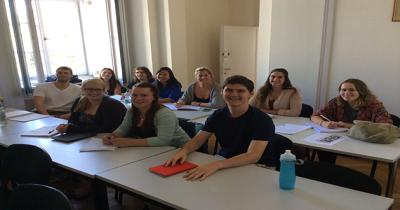
From the wealth of cross-national survey projects, data and research, scholars know a lot about the relationship between political behavior and democracy. Yet, we have only begun to use this wealth of knowledge to its fullest: international survey projects could be harmonized ex post and turned into ‘big data’ that consist of an unusually large number of variables and with individuals nested in countries and time periods.
This idea informed the two-part event Interdisciplinary Studies of Political Behavior and the Use of ‘Big Data’. The event consisted of a conference and a workshop. Organizers of the event included Ohio State’s Department of Sociology, Mershon Center for International Security Studies, CONSIRT and the Polish Academy of Sciences.
Ohio State’s Polish Studies Initiative played an important role in helping make this event a success. Through this initiative, event organizers were able to invite Andrzej Rychard, director of the Institute of Philosophy and Sociology, Polish Academy of Sciences. During the conference, Professor Rychard delivered a paper on political exit, voice and loyalty in contemporary Poland.
Graduate Students from the Graduate School for Social Research at the Polish Academy of Sciences (located in Warsaw, Poland) attended both the conference and the workshop to help train the next generation of international, interdisciplinary scholars.
The two-day event opened with a conference on the Interdisciplinary Studies of Political Behavior: From Elections to Protests (May 6-7, 2014). A multi-disciplinary mix of scholars from sociology, political science, international relations, area studies and communications presented theoretically grounded empirical papers that engaged with causes and consequences of different types of political behavior. Big data methodological topics included ex post data harmonization of 21 cross-national survey projects from the 1960s to the present (Kazimierz M. Slomczynski, director of CONSIRT and Irina-Tomescu-Dubrow, associate professor at PAN and program manager of CONSIRT) and political event counts from international news wires (Thomas Maher, Ohio State sociology, and J. Craig Jenkins, director, Ohio State’s Mershon Center for International Security Studies). Other attendees included Pamela Paxton (University of Texas-Austin, sociology), Emily Beaulieu (University of Kentucky, political science), Irfan Nooruddin (Ohio State, political science), Edward Crenshaw, (Ohio State, sociology), Erik Nisbet (Ohio State, communication), Richard Gunther and Paul Beck (Ohio State, political science), and Melanie Hughes (assistant professor of sociology, University of Pittsburgh; Ohio State alumna).
The workshop “Comparability of Survey Data on Political Behavior: Ex Post Harmonization of Selected Survey Projects” focused on key methodological and statistical issues in comparability of survey data in the context of harmonization. Discussions benefited from expert insights of established scholars, including that of Professor Dean Lillard, Ohio State’s College of Education and Human Ecology, who is the principal investigator of the Cross-National Equivalent File (CNEF).
Event organizers are planning a special publication based on the event, and a newsletter designed to build a scholarly community on methodological issues in survey data harmonization.
Interdisciplinary Studies of Political Behavior and the Use of ‘Big Data’ was organized within the research project “Democratic Values and Protest Behavior: Data Harmonization, Measurement Comparability, and Multi-Level Modeling in Cross-National Perspective,” funded by the Polish National Science Centre within the framework of the Harmonia grant competition (2012/06/M/HS6/00322) and housed in the Institute of Philosophy and Sociology, Polish Academy of Sciences. For more on this project, please visit the data harmonization website, dataharmonization.org
